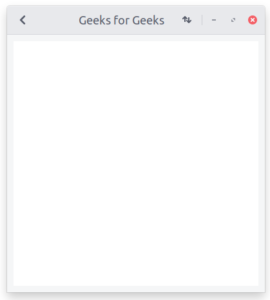A Gtk.HeaderBares igual que la horizontal Gtk.Box, permite colocar niños al principio o al final y mostrar el título. GTK+ es compatible con la decoración del lado del cliente, por lo que podemos usar una Gtk.HeaderBaren lugar de la barra de título. El título irá centrado con respecto al ancho de la caja. A Gtk.HeaderBargeneralmente se encuentra en la parte superior de una ventana y debe contener controles de uso común que afectan el contenido a continuación. También brindan acceso a los controles de ventana, incluido el botón de cerrar ventana y el menú de ventana.
Siga los pasos a continuación:
- importar módulo GTK+ 3.
- Crear ventana principal.
- Crear barra de encabezado.
- Crear botón.
- Crear Caja.
Ejemplo:
import gi
# Since a system can have multiple versions
# of GTK + installed, we want to make
# sure that we are importing GTK + 3.
gi.require_version("Gtk", "3.0")
from gi.repository import Gtk, Gio
class HeaderBarWindow(Gtk.Window):
def __init__(self):
Gtk.Window.__init__(self, title ="GfG")
self.set_border_width(10)
self.set_default_size(400, 400)
# Create HeaderBar.
hb = Gtk.HeaderBar()
hb.set_show_close_button(True)
hb.props.title = "Geeks for Geeks"
self.set_titlebar(hb)
# Create Button
button = Gtk.Button()
icon = Gio.ThemedIcon(name ="mail-send-receive-symbolic")
image = Gtk.Image.new_from_gicon(icon, Gtk.IconSize.BUTTON)
button.add(image)
hb.pack_end(button)
# Create Box
box = Gtk.Box(orientation = Gtk.Orientation.HORIZONTAL)
Gtk.StyleContext.add_class(box.get_style_context(), "linked")
button = Gtk.Button()
button.add(Gtk.Arrow(Gtk.ArrowType.LEFT, Gtk.ShadowType.NONE))
box.add(button)
hb.pack_start(box)
self.add(Gtk.TextView())
win = HeaderBarWindow()
win.connect("destroy", Gtk.main_quit)
# Display the window.
win.show_all()
# Start the GTK + processing loop
Gtk.main()
Producción :
Publicación traducida automáticamente
Artículo escrito por amalchandranmv y traducido por Barcelona Geeks. The original can be accessed here. Licence: CCBY-SA